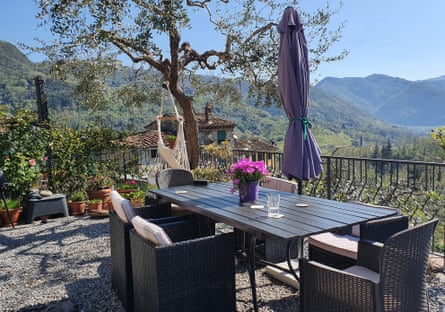Over the past 19 years, Ewan and Laura Hastings have been on 59 holidays. But the couple are not millionaires with a jet-set lifestyle – they live in a small village in Scotland and work in the voluntary and public sector. Their secret is house swapping, a tactic that has saved them an estimated £70,000.
“Last month we went to Pacific Grove in California and spent two and a half weeks in this beautiful detached house with wonderful views overlooking Monterey Bay and the coastal mountains,” Ewan says. “Next month we’re off to Berlin.”
He is a charity fundraiser and his wife, Laura, is a nurse. They live in an ordinary three-bed detached house in Roslin, a village in Midlothian, Scotland, not far from Edinburgh. That is the only reason they can afford to go on holiday so frequently.
“We started swapping our home in 2003, when our children were young,” Ewan says. “And I can say, categorically, we would never have gone on so many holidays if we had not been doing that.”
Using the home-swapping websites HomeLink and Home Base Holidays, they have arranged to stay in the homes of strangers all over the world, who have simultaneously been able to enjoy a Scottish holiday in the Hastings’ Midlothian home. Often, the two families will swap cars, too, by adding the other drivers on to their existing car insurance policies.
“I would hazard a guess that we’ve saved at least £70,000 over the years on car rental and accommodation,” Ewan, 55, says.
As the cost of living crisis deepens, a holiday where you get to stay somewhere for free – simultaneously enabling another holidaymaker to save money, too – has rarely seemed more attractive.
 View image in fullscreenEwan and Laura Hastings on holiday in Jordan. Photograph: Ewan Hastings
View image in fullscreenEwan and Laura Hastings on holiday in Jordan. Photograph: Ewan Hastings
Many home swappers reckon they have saved four- or even five-figure sums on trips, and travelled to some amazing places they might otherwise have never gone to. Plus, it gives you the opportunity to “live like a local”.
But what are the potential pitfalls? How much does swapping cost and how easy is it to get a swap in practice?
The Guardian decided to put three home-swapping websites to the test. Could we swap a three-bed house in Cambridge for a dog-friendly, child-friendly rural retreat in Devon during October half-term?
With only a few weeks to arrange the swap, the pressure was on. First, we tried HomeLink, which costs £115 for a one-year membership – although if you sign up for three years, the cost goes down to £83.33 a year. You get a 30-day free trial, without needing to put in any payment details, and if you don’t arrange a swap in your first year, they will give you a second year free.
We found HomeLink very straightforward to use, with thousands of potential home swaps available all over the world, and asked to swap with four different members whose properties met all our requirements. However, seven days later, at the time of writing, none had replied to our requests.
Next up was Love Home Swap, which costs at least £96 a year. It offers a two-week free trial but you must enter your payment details before you can contact any swappers.
With this arguably rather complicated site, you don’t need to find someone who wants to holiday in your home. You can offer them points instead, which you earn by letting other members stay in your house for free. The amount of points you need varies from property to property, and you must pay a service fee of at least £49 every time you book a swap using your points. The longer you stay, the higher this fee is – a two-week stay, for example, will cost at least £109 – more if you want free cancellation and “travel support”. Alternatively, you can do a “classic” reciprocal swap, which is free.
Love Home Swap says the advantage of this system is flexibility. But we wanted to swap directly with another member for free, and, unfortunately, none of the three members we contacted agreed to this.
 View image in fullscreenSwapping their home in Roslin has saved Ewan and Laura Hastings an estimated £70,000. Photograph: Ewan Hastings
View image in fullscreenSwapping their home in Roslin has saved Ewan and Laura Hastings an estimated £70,000. Photograph: Ewan Hastings
The Guardian’s own website, Guardian Home Exchange, is run by Home Base Holidays and costs £35 for six months or £59 a year. You can send up to 10 messages and do a free two-week trial before you have to enter your payment details. On the day we joined, we found 12 properties that met all our criteria, and immediately used some of our free messages to request swaps with six. Less than four hours after we sent out the messages, the owner of our number one choice – a converted former chapel in a small village in north Devon – replied, agreeing to the swap. “Welcome to house swapping,” she wrote, adding that she also has a dog and a couple of kids. “We have been doing this for about 12 years and have never had a bad experience.”
Reviews of her home say the house is close to wonderful beaches and countryside, and is “the ideal location to get away from it all”. Best of all, it will all be free.
Other home-swapping websites include HomeExchange, which claims to be “the world leader in home exchange vacations” and boasts of having more than 450,000 homes in 159 countries. In the UK it costs £129 a year for unlimited exchanges – it is $175 (£157) when paying with US dollars – and you are not required to pay anything until you have found an exchange.
It is the only site that asked us to verify our identity and home address. It also provides cover against property damage, up to $1,000,000, although your guest will usually have to pay for the first $500 of damages. Like Love Home Swap, this site uses a points system. You can buy these points from the site, and depending on the size of the transaction, it will cost you between 25 cents and $2.50 a point.
Another option is Behomm, which describes itself as “the first home exchange community for creatives and design lovers” whose members “share a similar passion for beauty and tasteful things”. However, you must be invited to join.
Writers, theatre directors, artists, architects, poets, dancers and designers are among the professions welcomed by Behomm, as are “design lovers” who can demonstrate their passion for beauty. You must either be invited by another member or submit the URL of your work website, your work email address and your LinkedIn profile, along with photos of your home, and wait to see if you get an invitation to join from the site’s founders. If you do, it will cost you €280 (£245) to join, and you can either make direct or non-simultaneous exchanges.
Protect yourself – and your property
If you decide to do home swapping, it is vital that you tell your buildings insurer and contents insurer that you have guests coming to stay, or you may not be covered if, for example, there is a fire or your property is flooded while your guests are staying.
“The risk is that if the insurance company doesn’t know there’s been a change in the person living in the property on a temporary basis, that could cause problems if there is a claim,” Malcolm Tarling at the Association of British Insurers says.
Similarly, if you are renting, you should talk to your landlord about doing a home swap – for example, so they can ensure the building is properly insured. If you are letting your swappers use your car, you must inform your motor insurer first.
Once informed, your home insurer may request additional information about your guests and apply temporary exclusions to your cover. For example, it is very likely you will not be insured for theft and malicious or accidental damage to your property while your guests are staying there.
When you buy travel insurance, make sure it covers you for any accidental damage you cause to a holiday home
If such restrictions are placed on your policy, you can take out a low-cost top-up insurance policy from companies such as Guardhog or Pikl, which will cover you for these specific risks on the days when your guests are staying. Usually you will also get public liability cover, which protects you if, for example, your microwave blows up and injures your guest, or they trip over your paving stones and then decide to sue you for bodily injury. Typically these policies will only cost you a few pounds a day of your guest’s trip, or you can get an annual top-up policy for about £100. You can also get full buildings and contents insurance policies from these providers, if your existing insurer refuses to allow you to swap at all.
When you buy travel insurance, make sure it covers you for any accidental damage you cause to a holiday home you are staying in, including any properties you stay in for free. The circumstances under which you can claim this cover should be listed under the personal liability element of the policy, so read it carefully. While you may be comfortable paying for any minor damage out of your own pocket, you don’t want to be hit with a large bill for accidentally wrecking a swimming pool or a kitchen worktop, for example.
 View image in fullscreenA Tuscan village house in Tempagnano featured on the Home Base Holidays website. Photograph: Sally Cleaves/Home Base Holidays
View image in fullscreenA Tuscan village house in Tempagnano featured on the Home Base Holidays website. Photograph: Sally Cleaves/Home Base Holidays
Most travel insurance policies are not, however, designed for swappers. If you need to book flights or expensive days out in advance, bear in mind that your swapper may need to cancel the swap at the last minute because of circumstances beyond their control. You may not be covered by your travel insurance policy for any loss you suffer as a result, so in this situation you should immediately inform the home-swap website you used. They may be able to help you find another swapper at short notice who can provide you with alternative local accommodation.
‘We’ve saved £30,000’
Richard Storey, 83, and his wife, Sue, 75, live in a stylish two-bed flat in the heart of Clifton Village in Bristol. They have been members of HomeLink for almost 30 years and estimate they have saved at least £30,000 on holidays during that time. “We’ve had two offers in the last month – one from Barcelona and one from Australia,” Richard says.
At the moment they are preparing for a trip to Edinburgh. “People often ask us: aren’t you worried about somebody being in your house? To which we say no, because they’re not worried about us being in their house. It’s absolutely reciprocal,” Richard says. “Any minor breakages – I think we’ve had about three – were of tiny things, and everyone has been absolutely happy to replace the items.”
It’s easy to lock away your valuables, private documents and precious personal belongings in a room or a cupboard, he says. “But most people frankly leave an office or a study just as they find it.”
Whenever they swap, Dexter, their “very independent cat”, stays behind. “He needs very little looking after – just one sachet of food a day,” Sue says. In return, she offers to look after the cats of anyone they swap with.
On one memorable swap, the couple found themselves staying in a high-end property in a gated community on a golf course in California’s Napa Valley and being invited round to their wealthy neighbours’ house for dinner. “But believe me, you don’t have to have a grand property to swap. It’s more to do with place and the location of your home,” Richard says.
‘You benefit yourself and other people’
Stuart and Barbara Wilson have just got home from a holiday in Mallorca. Since they first joined the Guardian’s home-swapping website two years ago, they have swapped their five-bedroom home on the Welsh-Shropshire border – which has its own heated swimming pool and an acre of garden – eight times.
 View image in fullscreenBarbara and Stuart Wilson have swapped their home eight times. Photograph: Barbara and Stuart Wilson
View image in fullscreenBarbara and Stuart Wilson have swapped their home eight times. Photograph: Barbara and Stuart Wilson
“At first we were quite nervous,” Stuart, 70, says. “There’s a bit of trepidation when you first come home, thinking: is it all going to be OK?”
But he liked the idea of sharing his biggest financial asset – his home – with another family who wanted to stay there. “By swapping, you benefit yourself and other people.” He feels his house is more secure when there are people inside it, and usually arranges with his swappers that they will water each other’s plants. “That’s a major benefit for us, due to the size of our garden.”
In the past two years the couple have been away on holiday to many interesting places it had never previously occurred to them to visit. “You get an offer and it’s a surprise,” he says. “You look into where it is and think: ‘Yeah, why not, let’s go there.’”
In total, he estimates they have saved about £6,000 by swapping. But it hasn’t all been plain sailing. “The site asks if you are ‘very house proud’, ‘fairly house proud’ or ‘relaxed’. Well, we realised we were not ‘relaxed’ when we went to a house that was.”
‘It’s made such a difference’
For Alicia and David Reilly, who have three children aged from four to 11, home swapping has been life-changing. “When you have three children in a hotel room, it gets cramped very fast,” Alicia says. “I’d also worry about them being noisy.”
She lives in a three-bed semi on a “nice estate” in Hampshire but is from San Diego and uses home swapping as a way to have a long, cheap holiday back home. “We go for the whole summer.” It is a lot less stressful than staying in a hotel or an Airbnb, she says. “It’s just easier. It’s a home designed for families, kitted out for kids, with all the home comforts that you need.”
Before she joined the website Love Home Swap, she could only afford to visit her family for two weeks at a time, often staying with relatives to avoid the expense of an Airbnb. “It was very intense. We would start to feel like we were taking over their home.”
 View image in fullscreenChisara Nwabara and Sensi at Sacré Coeur, Paris. Photograph: Chisara Nwabara
View image in fullscreenChisara Nwabara and Sensi at Sacré Coeur, Paris. Photograph: Chisara Nwabara
She doesn’t do direct swaps, as she has never managed to find a member in San Diego who wants to come to Hampshire for the summer: “We find it easier to get points and do it that way.” She uses the points she earns every time someone stays in her home to ‘pay’ for her accommodation in San Diego. When she doesn’t have quite enough points, she borrows points from the site, which she estimates has cost her at least £500 so far. However, she reckons she has saved more than £10,000 on accommodation.
‘It feels safer’
Chisara Nwabara, a 35-year-old tech director, started swapping her one-bed rental flat in north London three years ago, via the website Love Home Swap. “It’s a very different experience than staying at a hotel or an Airbnb – it’s a lot more personal,” she says. “And it feels safer but it’s not a transaction. It’s more like sharing.”
On one swap she got to stay in a pet-friendly chateau in France for three weeks with her dog, Sensi. Another swap was for a four-bed cottage in the Cotswolds with an edible garden, and when she went to Barcelona, she had a beachside apartment right in the heart of the city. “You can get really good value for money,” she says. “I’ve probably saved at least £5,000.”
Top tips for a successful swap
-
When you list your home, highlight its features: is there a garden? A dishwasher? What’s the parking situation, etc? Include details of things to do nearby and attractions further afield. Don’t disguise any downsides.
-
House swappers usually provide a dossier for their guests with details of local attractions and recommended pubs and restaurants, useful information such as how to turn off the alarm, how the TV system works, the wifi code, useful phone numbers (taxi, doctor, etc) and emergency contact details.
-
Clear wardrobe space in every room, spring-clean your house and declutter. Don’t forget to clean inside the fridge and vacuum under the sofa.
-
Provide spotless towels and bed linen. No one wants to sleep on a stained sheet. You may want to ask if you can bring your own towels and vice versa for your swappers, which may save you laundry costs.
-
Lock away anything precious or valuable, ideally in a room you can also turn into a “dumping corner” for any messy detritus that is normally left around the house.
-
Give yourself as long as possible to find a swap, especially if you are bringing your pet or want to go somewhere specific, as it can be harder to find a match in these circumstances.
-
Buy some cheap wine glasses for your guests to use – when it comes to breakages, experienced swappers say wine glasses are top of the list.





